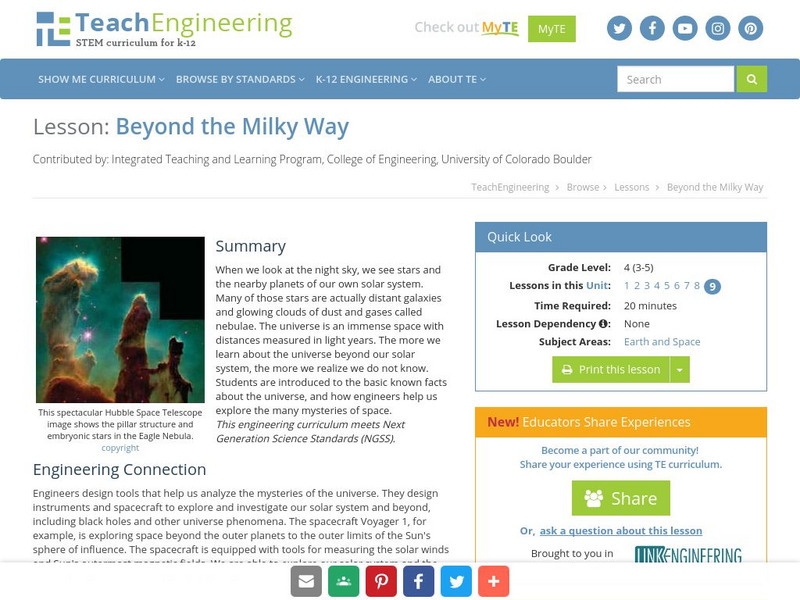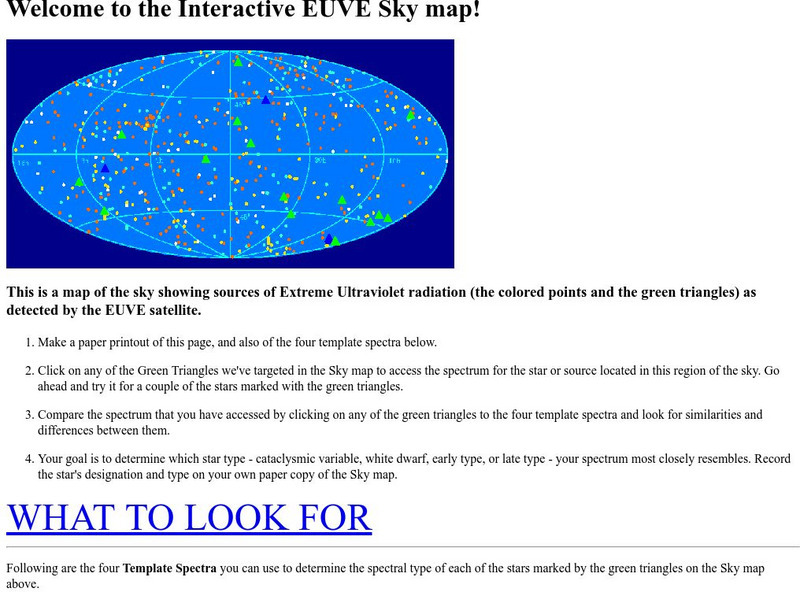Hi, what do you want to do?
Curated OER
Quiz: Name the Constellation
In this science worksheet, 3rd graders focus on the stars and constellations. Students respond to nine questions using written clues and visual aids.
Curated OER
Stellar Magnitudes
Students analyze the stellar magnitude scale. In this stellar magnitude lesson plan, students examine the stellar magnitude scale. Students predict the Sun's magnitude from various planets.
Curated OER
Constellations
Fifth graders create their own constellations using pin holes and black paper. For this space science lesson, 5th graders write a story about their constellation. They share their project with the class.
Curated OER
Oxidation and Combustion: Chemical Reactions in Fire
High schoolers investigate the art and science of pyrotechnics. In this chemistry and computer lesson, students learn about the chemical basis of fire and structure of fireworks. High schoolers then apply their...
Curated OER
September Science Internet Activity
For this energy worksheet, students click on the links in the questions about energy to find the answers to the questions and then come back and answer the questions. Students answer 12 questions total.
Curated OER
Timekeeping by the Sun
Students measure shadows to learn about the Sun-Earth relationship. In this astronomy lesson, students create a shadow stick of a Pokemon character and record measurements of its shadow in a data chart. Follow-up discussions guide...
Curated OER
Mercury
Students study the planet Mercury and develop an understanding of the planet's composition, geology, and other important characteristics. They explore a Web resource on the planet Mercury which is the central focus of this lesson.
Curated OER
Cosmic Wheels
Students build a scale model of the Solar System and determine the time other planets take to travel around the Sun in comparison to the time of the Earth's revolution. The velocity of the planets are also determined in this lesson.
Curated OER
Three D Constellations
Students address a major misconception in astronomy, the understanding of scale. The lesson is designed to introduce students to both celestial coordinates and to the first rung on the distance determination ladder, parallax.
Curated OER
Science - Lesson 42 - Astronomy
Third graders demonstrate the position of the Earth, Moon, and Sun in a solar and lunar eclipse. They list uses for manmade satellites and write a description of how a satellite would be use.
Curated OER
Palm use in Astronomy
Learners identify and recall common constellations by using a palm pilot with astronomy software. Students will use their Palm to assist them in correctly identifying constellations using a telescope.
Curated OER
U Letter Ideas
Students participate in activities that begin with the letter "U". They also expand their vocabulary.
Curated OER
Planets, Constellations, and Stars
In this space science worksheet, students find the answers to the research questions that focus on the stars, planets, and constellations.
Curated OER
The Gulf War and its Consequences
Students study the historical background of Desert Storm/Desert Shield. They determine that not all Americans were in favor of the Gulf War and examine the Gulf War Syndrome. They discover that another possible cause pertains to...
Curated OER
Physics The Earth and Beyond
Fourth graders will explore our solar system. In this physics lesson plan students create a model of the solar system to explore the movement of Earth, the Sun, and stars.
Curated OER
A DISAPPEARING ACT Astronomy: Do Stars Always Shine?
Students observe why stars are not visible during the day with a classroom demonstration using an index card punched with holes.
NASA
Nasa: Night Sky Network: Pocket Solar System
Individual or classroom activity helps students understand the solar system because they can visualize it. Extension resources are included.
Utah Education Network
Uen: The Night Sky
Learn about the rotation of the earth, the movement of the moon, and the position of the sun.
Utah Education Network
Uen: Trb 3:1 Investigation 6 Celestial Model
Third graders will gain an understanding of why stars appear to move across the night sky.
Science Buddies
Science Buddies: Using a Digital Camera to Measure Skyglow
This is a great project for someone that is interested in both stargazing and photography. Bright city lights and even the light of the full moon obscure the dimmest stars, which can make identifying constellations more difficult. This...
TeachEngineering
Teach Engineering: Beyond the Milky Way
When we look at the night sky, we see stars and the nearby planets of our own solar system. Many of those stars are actually distant galaxies and glowing clouds of dust and gases called nebulae. The universe is an immense space with...
University of California
Interactive Extreme Ultraviolet Skymap
A map showing a view of the night sky is given; sources of extreme ultraviolet light are marked. Visitors analyze the spectrum from these parts of the sky and attempt to determine which star type the spectrum most closely resembles.
PBS
Pbs Teachers: Voyage to the Mystery Moon
Observe the night sky and speculate the distance between the Earth and its moon and Saturn and its moon. Explore how scientists have used robots to learn about celestial bodies, and conduct research about one of Saturn's moons.


























